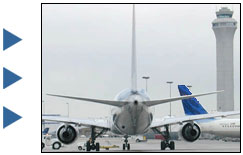Baggage Handling eTool
Solutions for Baggage Handling

Airline employees, including ticket agents and ramp agents, handle passenger baggage at several points throughout the baggage handling process. The body postures, repetitions, and forces required to lift, lower, push, pull, or carry passenger baggage can create potentially serious ergonomic hazards for the agents.
This eTool was developed as part of the OSHA-Airlines Industry and National Safety Council’s International Air Transport Section Alliance. This eTool describes many of the common hazards associated with the baggage handling process as well as providing possible solutions that are ranked according to their feasibility to the operations. See Ergonomics for general solutions.
See OSHA's Workers' Rights page for more information on rights and protections.
*eTools are web-based products that provide guidance information for developing a comprehensive safety and health program. They include recommendations for good industry practice that often go beyond specific OSHA mandates. The recommendations proposed may not be be applicable to each airline. As indicated in the disclaimer, eTools do not create new OSHA requirements.


